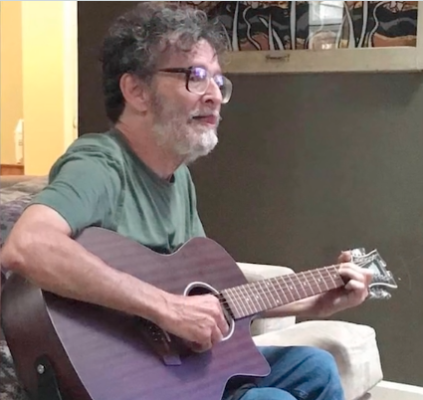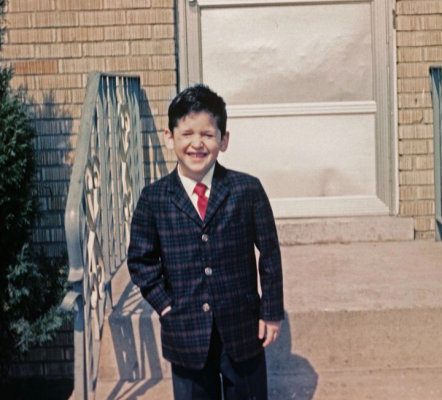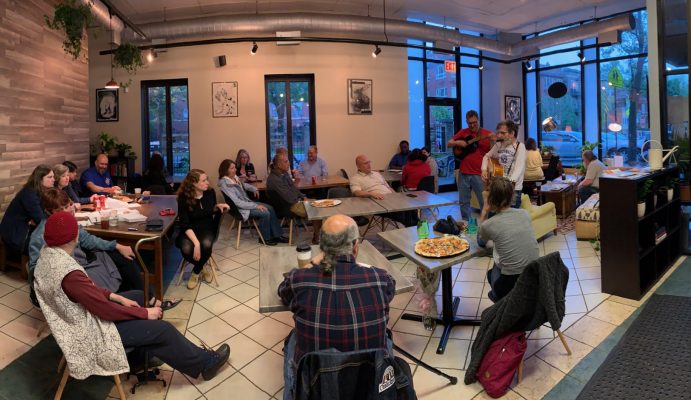Bill Goodman: Musician, History Buff, Friend to All
By Chris Rogers | September 10, 2022
Call Bill Goodman and reach his voicemail, and you’ll be met with a booming response.
“Good afternoon, this is the residence of Sherlock Bones Goodman and Bill Goodman. Sherlock Bones Goodman is out combing the area for clues… If you need to leave a message for Sherlock, please bark clearly.”
It’s a voicemail that’s sure to put a smile on anyone’s face. So will any conversation with Goodman.
He brings that enthusiasm and excitement to everything he does. An avid musician and history buff, he’ll gleefully talk at length about his memories growing up playing folk tunes with his uncle, singer-songwriter Pete Seeger; his beloved schnauzer terrier, Sherlock Bones; and everything in between.
He looks for the positive in every situation he encounters – even an unexpected diagnosis.
For years, he suffered from various developmental delays and mobility issues. At age 56, he went in for a brain scan and the doctors found a cyst, which they diagnosed as Dandy-Walker. Much to his doctor’s surprise, he took it in stride.
“I accepted it,” Goodman said. “I said ‘okay,’ and the doctor said, ‘no you didn’t hear me, you have a cyst in your brain.’ He said most people were scared [with this diagnosis], but I wasn’t.”
In fact, the diagnosis was in some ways a relief for him, finally giving him an answer to years of questions about himself.

“Everybody thought I was just slow and everything, but then they found out it was Dandy-Walker,” he said. “It affects your motions, it slows down my speech, and so I finally understood [what was causing all of that] then.”
Goodman’s main concern, in fact, was how to help future generations of Dandy-Walker patients. Getting the diagnosis in his 50s didn’t substantially change his life, but he knew that research into the condition could lead to better treatments for those who are younger and had more severe cases of Dandy-Walker.
“So many people have a disease and just want it cured,” he said. “I don’t care if it’s cured or not in my life, but in others’ lives I want them to come up with a treatment for it very much so.”
Not long after his diagnosis, he entered in a research study with the University of Chicago, hoping to be part of a solution toward a greater cure for Dandy-Walker.
Goodman attributes his response in part to his younger brother Andy, who died of leukemia in 1981. When Andy faced a tough diagnosis, he stayed grounded and started to look for how he could use his illness to make an impact.
He participated in research studies working toward a cure, and made sure everyone in his life felt included and welcome, whether that be his peers in the hospital or his friends and family.
“When he was in the hospital, we brought him movies to see,” Goodman remembered. “He had us bring them out and show them in the visiting area too, so more people could see them.”

Goodman has numerous stories about growing up with Andy, as well as his uncle Pete and aunt Toshi Seeger, who he says were like parents to him. The three of them, among others, served as guiding influences in his life. They all accepted him for who he was, never poking fun at his slurred voice or calling him slow.
“They told me: ‘you can do stuff with life, don’t let this stop you,’” he said.
That mantra guided him through school, earning him a bachelor’s degree in political science and a master’s in history. He loves talking about U.S. history, especially the progressive era, and recalling famous speeches from our nation’s past.
His true passion, however, is in his blood: music. His grandparents were musicians and first introduced him to what became a lifelong love.
But Pete, one of the most prolific songwriters of the 20th century, taught him how to write songs and evoke feelings through music. One of Goodman’s favorite memories, he says, is sitting on the steps of a building in Chicago with Pete and Andy, playing guitars and banjos, singing, and laughing.
He also maintains a close relationship with folk singer Arlo Guthrie – a family friend and his “uncle by adoption,” as he calls him. Like Guthrie and his uncle Pete, Goodman has used music as an outlet to express himself and relate to those around him.
Many phone conversations end up with him grabbing his guitar and singing a verse or two of a folk classic. He sees music as the ultimate connector.
“I love bringing people together,” Goodman said about playing music. “When I play [for people], I always ask them to sing along.”
Goodman stayed close with Toshi and Pete until their deaths in 2013 and 2014, respectively. He credits them in part for his upbeat demeanor, saying that every time he talked with them, whether on the phone or in person, they would all laugh and exchange stories and jokes.
Now in his late 60s, Goodman carries on their legacy in his Chicago community, both musically and otherwise. He regularly plays small concerts with his friends, continuing his mission of bringing people together through music.
He helps at the local soup kitchen, shopping every week for food and supplies to help them distribute meals to the less fortunate in his community. He is an active member of his church, and always eager to learn, he engages in interfaith dialogues with members of other religious groups in his area.
In addition to his involvement in his favorite local organizations, he and Sherlock Bones have become celebrities in their neighborhood.
“People open their windows and yell ‘morning Sherlock,’ when we’re walking down the street,” Goodman laughed. “They call her the queen of Thorndale Avenue.”
Sherlock, he says, brings him so much peace and happiness, and gives him a companion to navigate life’s adventures with.
At home, when he’s not playing folk tunes, Goodman channels his creativity in another way: painting. He loves to create nature scenes – lakes, forests,
sailboats on the water – colorful imagery that would brighten anyone’s day.
And despite facing challenges throughout his nearly 70 years of life – the loss of his brother in his 20s, being bullied for developmental disabilities, a Dandy-Walker diagnosis in his 50s – Goodman maintains a disposition true to his upbringing in the 1960s and 70s, one that would put a smile on his uncle Pete’s face.
“When I play music for people, I always say, ‘we can sing in harmony, now wouldn’t it be great to see people living in harmony too.”



